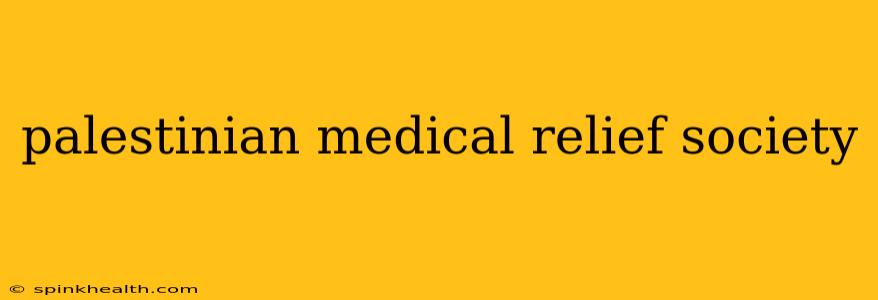The Palestinian Medical Relief Society: A Lifeline in the Occupied Territories
The Palestinian Medical Relief Society (PMRS) isn't just an organization; it's a lifeline for millions in the occupied Palestinian territories. Imagine a world where access to basic healthcare is a luxury, not a right. That's the reality for many Palestinians, a reality the PMRS works tirelessly to change. Their story is one of resilience, compassion, and a unwavering commitment to providing vital medical services in the face of immense challenges.
This isn't just another humanitarian organization; it's a deeply rooted part of the Palestinian struggle for health and well-being. From its humble beginnings to its current extensive network, the PMRS has witnessed and actively responded to the evolving healthcare needs of the Palestinian people, adapting to the ever-changing political and social landscape.
What does the Palestinian Medical Relief Society do?
The PMRS's work is multifaceted, encompassing a wide range of crucial healthcare initiatives. They don't simply provide medical care; they build and sustain healthcare infrastructure, train medical professionals, and advocate for improved healthcare policies. They are the bridge connecting those in need with essential medical resources, often in incredibly difficult circumstances.
Their services range from primary healthcare clinics providing routine checkups and vaccinations to specialized care in areas like oncology and pediatrics. They also offer crucial mental health services, recognizing the profound impact of conflict and occupation on the psychological well-being of Palestinians. The PMRS also plays a critical role in emergency response, providing immediate medical aid during times of conflict or natural disaster. Think of them as the first responders, often operating in incredibly dangerous and challenging environments.
How is the PMRS funded?
The PMRS relies heavily on international donations and grants to fund its operations. Their work is entirely dependent on the generosity of individuals and organizations around the world who believe in their mission. These donations directly support the delivery of medical services, the training of medical personnel, and the maintenance of vital healthcare infrastructure in the occupied territories. Transparency in their financial reporting is a crucial aspect of their commitment to accountability to their donors.
What are the main challenges faced by the PMRS?
The PMRS faces numerous challenges in its work, many stemming from the ongoing Israeli-Palestinian conflict and the occupation of Palestinian territories. These challenges include:
- Restricted access to patients: Movement restrictions imposed by the Israeli authorities often hinder the ability of medical professionals to reach patients in need, especially in the besieged Gaza Strip and areas under blockade.
- Shortage of medical supplies and equipment: The blockade on Gaza severely restricts the import of essential medical supplies and equipment, forcing the PMRS to work under extremely difficult conditions.
- Funding constraints: The constant need for funding is a significant and ongoing challenge. The scale of the need is enormous, and consistent funding is vital for the continued delivery of essential services.
- Political instability: The volatile political situation in the region significantly impacts the PMRS's ability to operate effectively. Security concerns and political tensions often create additional hurdles.
What is the impact of the PMRS's work?
Despite these challenges, the impact of the PMRS's work is undeniable. They have provided vital healthcare services to countless Palestinians, improving their quality of life and saving lives. Their commitment to training local medical professionals ensures the sustainability of healthcare services, empowering communities to care for themselves. The PMRS is more than just a provider of healthcare; it’s a symbol of hope and resilience in the face of adversity.
The Palestinian Medical Relief Society's story is a testament to human compassion and the unwavering pursuit of a fundamental human right: access to healthcare. It's a story of struggle and perseverance, a story that deserves to be told and supported.

